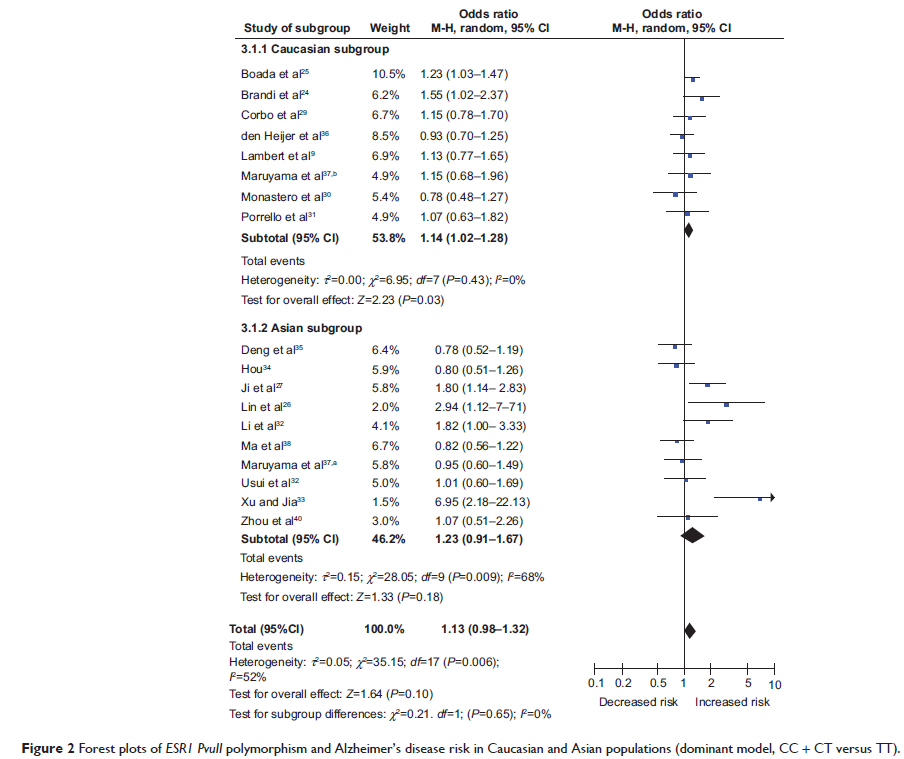109229
论文已发表
注册即可获取德孚的最新动态
IF 收录期刊
- 3.4 Breast Cancer (Dove Med Press)
- 3.2 Clin Epidemiol
- 2.6 Cancer Manag Res
- 2.9 Infect Drug Resist
- 3.7 Clin Interv Aging
- 5.1 Drug Des Dev Ther
- 3.1 Int J Chronic Obstr
- 6.6 Int J Nanomed
- 2.6 Int J Women's Health
- 2.9 Neuropsych Dis Treat
- 2.8 OncoTargets Ther
- 2.0 Patient Prefer Adher
- 2.2 Ther Clin Risk Manag
- 2.5 J Pain Res
- 3.0 Diabet Metab Synd Ob
- 3.2 Psychol Res Behav Ma
- 3.4 Nat Sci Sleep
- 1.8 Pharmgenomics Pers Med
- 2.0 Risk Manag Healthc Policy
- 4.1 J Inflamm Res
- 2.0 Int J Gen Med
- 3.4 J Hepatocell Carcinoma
- 3.0 J Asthma Allergy
- 2.2 Clin Cosmet Investig Dermatol
- 2.4 J Multidiscip Healthc

已发表论文
雌激素受体 α 基因多态性与阿尔茨海默氏症的风险:来自荟萃分析的证据
Authors Cheng D, Liang B, Hao Y, Zhou W
Published Date June 2014 Volume 2014:9 Pages 1031—1038
DOI http://dx.doi.org/10.2147/CIA.S65921
Received 10 April 2014, Accepted 2 May 2014, Published 30 June 2014
Objective: Human estrogen receptor α (ESR1 ) , a member of the nuclear receptor superfamily of ligand-activated transcription factors, is one of the key mediators of hormonal response in estrogen-sensitive tissues. Accumulating evidence has demonstrated that two of the most widely studied single-nucleotide polymorphisms in ESR1 – PvuII (T/C, rs223493) and Xbal (A/G, rs9340799) – are possibly associated with Alzheimer’s disease (AD). However, individual study results are still controversial.
Materials and methods: We searched PubMed, Embase, Web of Science, Science Direct, SpringerLink, and the Chinese National Knowledge Infrastructure databases for eligible studies assessing the association of ESR1 polymorphisms and AD risk (last search performed in November 2013). Thereafter, a meta-analysis of 13,192 subjects from 18 individual studies was conducted to evaluate the association between ESR1 polymorphisms and susceptibility to AD.
Results: The results indicated that a significant association was found between the ESR1 PvuII polymorphism and AD risk in Caucasian populations (CC + CT versus TT, odds ratio [OR] 1.14, 95% confidence interval [CI] 1.02–1.28, P =0.03; CT versus TT, OR 1.16, 95% CI 1.02–1.31, P =0.02), whereas no evidence of association was found in Asian populations. Nevertheless, we did not find any significant association between the ESR1 XbaI polymorphism and AD risk for any model in Caucasian and Asian populations (all P >0.05).
Conclusion: Based on this meta-analysis, we conclude that the ESR1 PvuII polymorphism might be a risk factor in AD development in Caucasian populations, not in Asian populations. Further confirmation is needed from better-designed and larger studies.
Keywords: Alzheimer’s disease, estrogen receptor, polymorphism, meta-analysis
Materials and methods: We searched PubMed, Embase, Web of Science, Science Direct, SpringerLink, and the Chinese National Knowledge Infrastructure databases for eligible studies assessing the association of ESR1 polymorphisms and AD risk (last search performed in November 2013). Thereafter, a meta-analysis of 13,192 subjects from 18 individual studies was conducted to evaluate the association between ESR1 polymorphisms and susceptibility to AD.
Results: The results indicated that a significant association was found between the ESR1 PvuII polymorphism and AD risk in Caucasian populations (CC + CT versus TT, odds ratio [OR] 1.14, 95% confidence interval [CI] 1.02–1.28, P =0.03; CT versus TT, OR 1.16, 95% CI 1.02–1.31, P =0.02), whereas no evidence of association was found in Asian populations. Nevertheless, we did not find any significant association between the ESR1 XbaI polymorphism and AD risk for any model in Caucasian and Asian populations (all P >0.05).
Conclusion: Based on this meta-analysis, we conclude that the ESR1 PvuII polymorphism might be a risk factor in AD development in Caucasian populations, not in Asian populations. Further confirmation is needed from better-designed and larger studies.
Keywords: Alzheimer’s disease, estrogen receptor, polymorphism, meta-analysis
